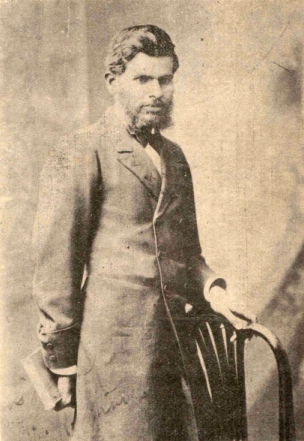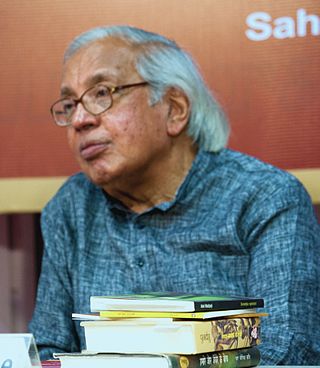A. R. Akela | |
|---|---|
 | |
| Born | 30 September 1960 |
| Occupation | Writer |
| Years active | 1980-Current |
Anant Rao, "A. R." Akela (born 30 September 1960) [1] is an Indian author, poet, folk singer and publisher. [2] [3] [4]
A. R. Akela | |
|---|---|
 | |
| Born | 30 September 1960 |
| Occupation | Writer |
| Years active | 1980-Current |
Anant Rao, "A. R." Akela (born 30 September 1960) [1] is an Indian author, poet, folk singer and publisher. [2] [3] [4]
Akela owns the publishing business Anand Sahitya Sadan. [5]

Rasipuram Krishnaswami Iyer Narayanaswami was an Indian writer and novelist known for his work set in the fictional South Indian town of Malgudi. He was a leading author of early Indian literature in English along with Mulk Raj Anand and Raja Rao.

Dalit, also previously known as untouchable, is the lowest stratum of the castes in the Indian subcontinent. Dalits were excluded from the four-fold varna system of Hinduism and were seen as forming a fifth varna, also known by the name of Panchama. Dalits predominantly follow Hinduism, with significant populations of the adherents of Buddhism, Sikhism, Christianity, and Islam. Scheduled Castes is the official term for Dalits as per the constitutions of India and Pakistan.

Kanshi Ram, also known as Bahujan Nayak or Manyavar or Saheb, was an Indian politician and social reformer who worked for the upliftment and political mobilisation of the Bahujans, the backward or lower caste people including untouchable groups at the bottom of the caste system in India. Towards this end, Kanshi Ram founded Dalit Shoshit Samaj Sangharsh Samiti (DS-4), the All India Backwards (SC/ST/OBC) and Minorities Communities Employees' Federation (BAMCEF) in 1971 and the Bahujan Samaj Party (BSP) in 1984. He ceded leadership of the BSP to his protégé Mayawati who has served four terms as Chief Minister of Uttar Pradesh.

Chamar is a Dalit community classified as a Scheduled Caste under modern India's system of affirmative action. Historically subject to untouchability, they were traditionally outside the Hindu ritual ranking system of castes known as varna. They are found throughout the Indian subcontinent, mainly in the northern states of India and in Pakistan and Nepal.
The Mallaah are the traditional boatmen and fishermen tribes or communities of North India, East India, Northeastern India and Pakistan. A significant number of Mallah are also found in Nepal and Bangladesh. In the Indian state of Bihar, the term Nishad includes the Mallah and refers to communities whose traditional occupation centred on rivers.

Jhalkaribai was a woman soldier who played an important role in the Indian Rebellion of 1857. She served in the women's army of Rani Lakshmibai of Jhansi. She eventually rose to a position of a prominent advisor to the queen, Rani of Jhansi. At the height of the Siege of Jhansi, she disguised herself as the queen and fought on her behalf, on the front, allowing the queen to escape safely out of the fort.
Namdeo Laxman Dhasal was a Marathi poet, writer and Dalit activist from Maharashtra, India. He was one of the founders of the Dalit Panthers in 1972, a social movement aimed at destroying caste hierarchy in Indian society. The movement was active in the 1970s and the 1980s during which time it popularised the usage of the term dalit in India. Dhasal was awarded the Padma Shri in 1999 and a Lifetime Achievement Award from the Sahitya Akademi in 2004.

Vitthal Ramji Shinde was a social and religious reformer in Maharashtra, India. He was prominent among the liberal thinkers and reformists in India, prior to its independence. He has been recognised as a social reformer and an activist fighting for greater equality in Indian society. He is particularly noted for opposing the practice of 'untouchability', and for championing support and education for 'untouchables', such as Dalits.

The Pasi is a Dalit (untouchable) community of India. Pasi refers to tapping toddy, a traditional occupation of the Pasi community. The Pasi are divided into Gujjar, Kaithwas, and Boria. They are classified as an Other Backward Class in Andhra Pradesh and Telangana. They live in the northern Indian states of Bihar and Uttar Pradesh.

Ashok Vajpeyi is an Indian Hindi-language poet, essayist, literary-cultural critic, apart from being a noted cultural and arts administrator, and a former civil servant. He was chairman, Lalit Kala Akademi India's National Academy of Arts, Ministry of Culture, Govt of India, 2008–2011. He has published over 23 books of poetry, criticism and art, and was awarded the Sahitya Akademi Award given by Sahitya Akademi, India's National Academy of Letters, in 1994 for his poetry collection, Kahin Nahin Wahin. His notable poetry collections include, Shaher Ab Bhi Sambhavana Hai (1966), Tatpurush (1986), Bahuri Akela (1992), Ibarat Se Giri Matrayen, Ummeed ka Doosra Naam (2004) and Vivaksha (2006), besides this he has also published works on literary and art criticism: Filhal, Kuchh Poorvagrah, Samay se Bahar, Kavita ka Galp and Sidhiyan Shuru ho Gayi Hain. He is generally seen as part of the old Delhi-centric literary-cultural establishment consisting of bureaucrat-poets and academicians like Sitakanta Mahapatra, Keki Daruwalla, J.P.Das, Gopi Chand Narang, Indra Nath Choudhari and K.Satchidanandan.
Dev Kumar is a Dalit writer and dramatist from India. A member of the Bhangi community, he established the Apna Theatre in April 1992. This has performed in Kanpur and surrounding areas with the aim of arousing Dalit consciousness.
Kailash Nath is an Indian Dalit writer and dramatist. He is known for his autobiography, Tiraskar (1999).
Saheed Chetram Jatav was a freedom fighter who was born on 19 July 1827. who participated in the Indian Rebellion of 1857. He joined the mutiny on 26 May 1857 in the Soro region of Eta district, North-Western Provinces. Them were tied to a tree and shot.

Uda Devi Pasi was an Indian women freedom fighter who participated in the war on behalf of Indian soldiers against the British East India Company, during the Indian Rebellion of 1857. She was a member of the women's squad of Wajid Ali Shah, the sixth Nawab of Awadh.

Mata Prasad is a retired Indian Administrative Service officer. He was one of the first people from the Scheduled Castes and Scheduled Tribes to become an IAS officer. He is a former chairman of the Union Public Service Commission of India. He served as the chief secretary of the state of Uttar Pradesh from June 1995 to October 1996, thus becoming the first Scheduled Caste officer to head the state bureaucracy. The Government of India awarded him the third highest civilian honour of the Padma Bhushan, in 2012, for his contributions to civil service.
Mahadeo Prasad is an Indian politician. He was elected to the Lok Sabha, the lower house of the Parliament of India from the Bansgaon constituency of Uttar Pradesh as a member of the Indian National Congress.
Swami Achhootanand, also known as Achutanand or Hariharanand, was an Indian anti-caste intellectual, Dalit writer, and social reformer. A former Arya Samajist, he became disillusioned with the Arya Samaj and established the Adi Hindu movement. He was a poet, critic, dramatist, and historian.
Khemchand Bohare, was a Dalit activist and social reformer.
Ramnarayan Yadavendu (1909–1951) was a Hindi writer, storyteller, essayist and social reformer.
Arjak Sangh was an organisation, which was actively working for the emancipation of Dalits in the Indian state of Uttar Pradesh in early 1970s. It was based on the idea of humanism and anti-Brahminism. Idol worship, fate, rebirth and soul are also some of the things they rally against. The Sangh was established in Lucknow by Ramswaroop Verma, the former Finance Minister under the Government of Uttar Pradesh, who was known for his work against Brahminism and for his championing the cause of Lower Castes. It was established in 1968 and from 1969 onwards its mouthpiece called Arjak Weekly came into being. It ran self-awareness drive amongst Dalit population in various belts of Uttar Pradesh and integrated the numerically powerful Chamar caste with itself. It also worked closely with other organizations, working in the sphere of Dalit emancipation. Through its publications like Achhoto Ki Samasya Aur Samadhan, Niradar Kaise Mite, it aimed to create a group of motivated Dalits, who could carry the movement forward.